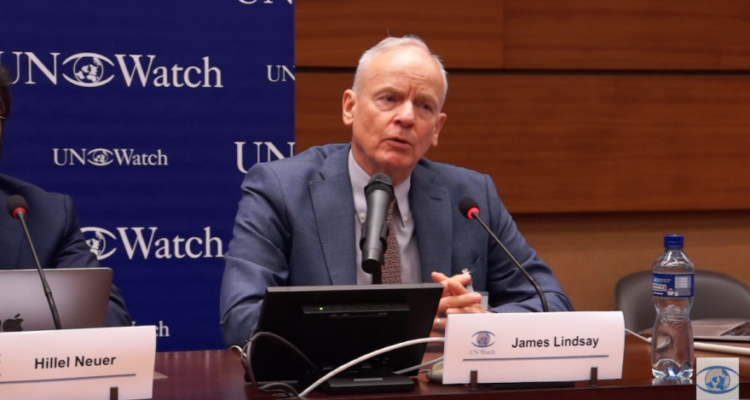The agency’s failure to resolve the Palestinian refugee problem “is really the failure of its donors,” says former general counsel James Lindsay, and stems from its definition of who is a refugee.
By Ellie Rudee, JNS
“Direct pressure” by donors is the most likely way to induce the United Nations Relief and Works Agency to change, former UNRWA general counsel James Lindsay told JNS as the 74th session of the U.N. General Assembly came to a close last week in New York.
Speaking from Geneva, Lindsay — the only former senior UNRWA official ever to have written a thorough critique of the agency, which is tasked with serving 5.6 million Palestinian refugees in Judea, Samaria, Gaza, eastern parts of Jerusalem, Syria, Lebanon and Jordan — told JNS that while the renewal of the agency’s mandate in the coming months was “pretty much a foregone conclusion,” donor countries can still have a very significant impact. (The agency’s mandate must be renewed every three years.)
Donors countries should be encouraged to do “the right thing,” he said, by “pressure and embarrassment,” if necessary.
As Palestinian and Jordanian ministers met on the sidelines of the General Assembly meeting to try to ensure a renewal of the agency’s mandate, Lindsay exposed various structural problems with UNRWA that go beyond alleged abuses of authority by senior agency officials. (UNRWA is currently under investigation by U.N. Secretary-General António Guterres following accusations of ethical misconduct and corruption.)
Speaking at a side event at the 42nd session of the U.N. Human Rights Council on Sept. 23, Lindsay critiqued the notoriously anti-Israel agency, suggesting that it must evolve or dissolve. Lindsay detailed UNRWA’s undermining of its own mission as a “humanitarian and welfare organization focused on the immediate relief of people in distress.”
For example, he said, only 10 percent of the organization’s current budget goes to basic, immediate needs, while the rest goes to education and medical care, which he called “governmental responsibilities.”
“There is no reason why the United Nations should be providing that,” he said.
UNRWA’s major structural problem, he said, is its unique definition of who qualifies as a refugee. According to the agency’s definition, Palestinians who have citizenship in their host countries, including 1.8 million Jordanian citizens, are still classified as refugees. This is unlike the definition used by the U.N. Human Rights Council, which is responsible for all other refugees around the world.
“We must address this definition and make it consistent with other definitions,” he said, which would require a “transfer of [various] responsibilities from UNRWA to Jordan.”
“From a practical standpoint,” Lindsay told JNS, “I suspect all member states already know that the UNRWA definition of a refugee should, from a moral and legal standpoint, be made identical to the definition for all other refugees in the world.”
Even so, he said, “UNRWA persists in falsely identifying people who are citizens of states as ‘refugees,’ perpetuating a sense of helplessness, victimhood and revanchism” among these Palestinians.
“By not demanding that UNRWA adopt the United Nations’ convention definition, the General Assembly has elevated politics over morality,” said Lindsay.
Moreover, he said that the failure of UNRWA, which he maintained “is really the failure of its donors,” to resolve the Palestinian refugee problem, is an impediment to peace, reinforcing the belief in a “right of return” among Palestinians —a “right” that he called “anathema to Israelis.”
‘In their mind, the war is not over’
Also speaking on Sept. 23, in the plenary of the Human Rights Council, former Knesset member Einat Wilf similarly spoke out against UNRWA, saying that the Palestinians had “hijacked” the organization after refusing to accept the outcome of the 1948 war that led to the creation of the State of Israel.
“The core issue is that in their mind, the war is not over. In their mind, the State of Israel is temporary,” she said. “If they view Israel as temporary, they will never sign an agreement that will bring peace. They will wait it out.”
Wilf, too, put the onus on Western donor states, “whose definition of peace is two states,” but who continue to “funnel money into this organization that makes [Palestinian refugees] think otherwise,” thereby “fueling and legitimizing the idea that a Jewish state is temporary.”
Since 2009, Lindsay said, the only donor state to take action against UNRWA was the United States, with U.S. President Donald Trump withdrawing America’s annual $360 million in funding to the organization. This, said Lindsay, “forced other states to fund UNRWA and highlighted UNRWA’s continuing use of its own, wholly inappropriate, criteria for determining who is a refugee.”
He expressed his “cautious optimism” that with new attitudes and pressure from the U.S. government, European governments and politicians may also begin to increase the difficulty in fully funding its operations. Lindsay called on additional UNRWA donors to push for these “rational changes” to the definition of a refugee, or push to dissolve the organization over the next five years.





